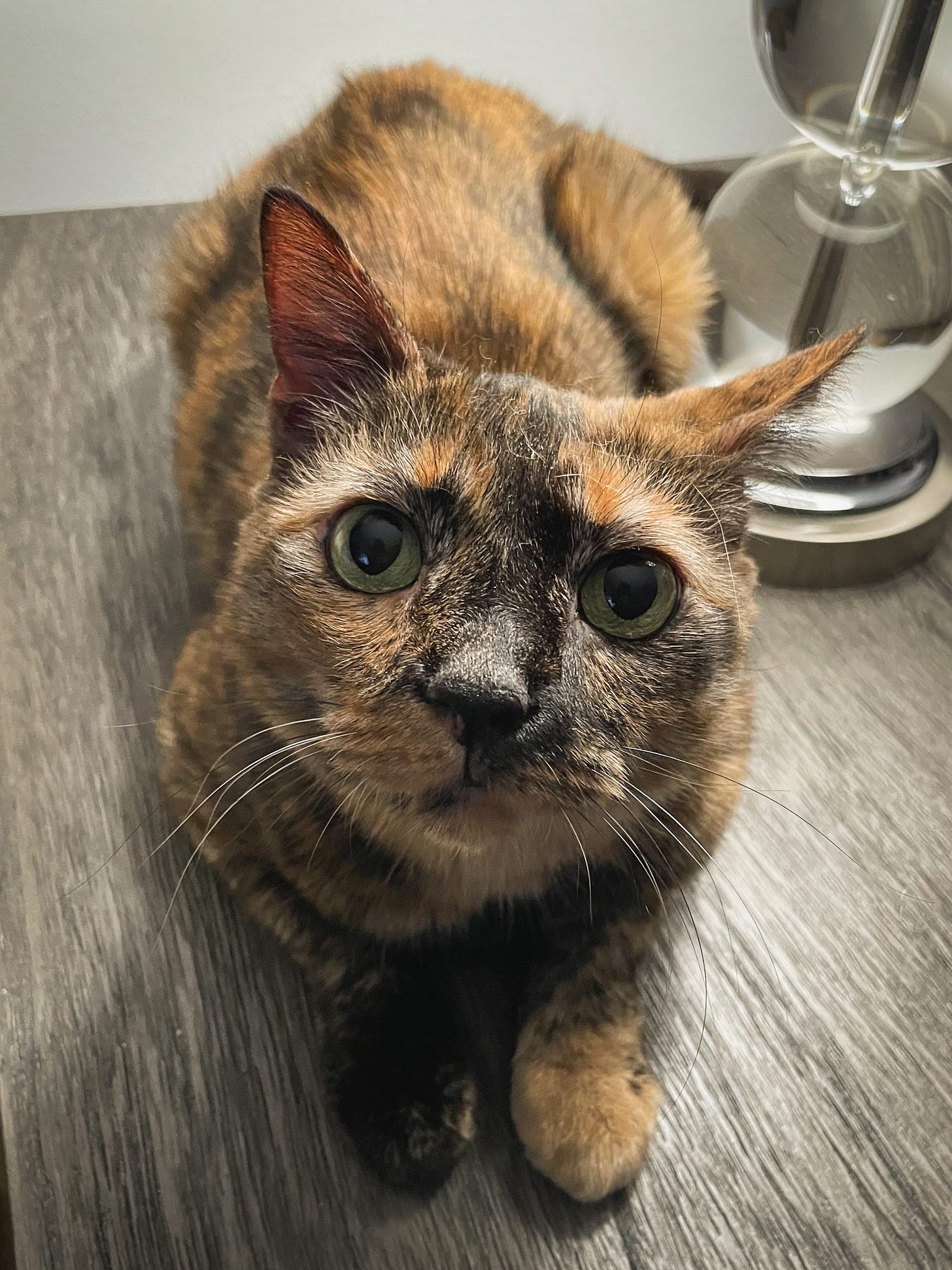We all know the joke: everything is content. Post it all on the internet for the algorithm to gobble up and distribute across the platform (whichever one it is), and hopefully you’ll get some growth and engagement. If you’ve got something to sell, this can seem like the key to unlocking the side-hustle achievement. (Or, depending what you’re doing, the main-hustle achievement.)
Everything’s fair game, isn’t it? That funny thing your dog did? What you ate for breakfast? Your spouse’s annoying habit? Your baby’s first steps? People love babies and it’s important to share something personal with them every now and then, right?
I want to say upfront that I’m not here to shame anyone for what they do or don’t share online. I’m not the boss of you. I’m not the content police.
But if you’ve ever had that little niggle of discomfort, the one that makes you wonder if you’ve shifted from being transparent into oversharing, this one’s for you.
And if you’ve been seeing that advice — everything is content — and it makes you uncomfortable and you don’t want to share that much, this one’s for you, too.
Let’s get into it.
You can always choose to share something later, but you can’t unshare it.
I touched on this in my letter “Seven Tips to Survive Social Media,” but it’s so important that I need to put it in front of you again. At the top.
Whatever you say online, it’s still there even if you delete it. Someone took screenshots. It’s in the Wayback Machine. A server out there has it backed up.
I don’t say this to scare you, just to remind you of something you already know: the internet is forever.
And that’s relevant with everything I’m about to talk about.
What you share online defines you.
When you’re an author, you’re a brand whether you like it or not.1
You might associate me with a few topics: I post about books, yarn, cats, writing and publishing, and sometimes astronomy, climate change, and video games. I don’t post about a lot of other stuff, including my personal life, my opinions on things, current discourse, and — I don’t know — everything that isn’t in that list above. That was a deliberate choice I made years ago, once I realized I wouldn’t be just some internet rando when my books were published, but a Public Figure. I made a choice to be authentic2 but not fully transparent.
I wanted to give my readers real me but not all of me.
Does that make sense?
And honestly, I’d advise you to do the same. Figure out what you want to share, how you want The Online to perceive you, if you want The Online to perceive you at all.
How do you want to be defined? And will you want to be defined by that ten years from now?
It’s not fair that everything you share digitally reflects on you for eternity. Authors are just people. We’re always growing, making mistakes, learning from them, and growing some more. Everyone should be allowed to evolve, but that’s not easy when someone can see who you were five years ago and react to it now.
For example — and this is a silly example, but hear me out — let’s say ten years from now, the online consensus is that we don’t post pictures of cats3 because of the Great Cat Controversy or Feline Revolution or whatever. Regardless, cat photos are not considered acceptable anymore.
Oh boy, does my “brand” have to shift. That’s going to take some work. But okay. I stop posting cat photos, lose all the cat fans (sob!), and make an effort rebrand myself to Bird Person.4 It takes effort, but that’s how people know me ten years from now.
Still, ten years from now, someone does a search for writing sequels lands on “When you know you’re writing for a limited readership.” They’re going to see that photo of Hildy looking Concerned. They’re going to know about me. A Cat Person. They’re going to react to it in the moment and there’s nothing I can do about it, even if I’m not (publicly) a Cat Person anymore.5
Fair or not, being a Cat Person is still part of my brand ten years from now, at least for the people just discovering my not-so-secret history.
I know that’s a silly example. If you want a more serious one, this post — “Stop opening up about your mental health online” by
— discusses the same topic. I found it very thoughtful and compassionate.This isn’t to say you shouldn’t post cats or mental health or whatever it is that you share. Only to remind you that the Overton Window is always shifting. You are always changing, evolving. And as I said, you can’t unshare something. Not really.
And honestly? I have shared outside my chosen lanes before. Usually it’s fine. But I’ve regretted it often enough that I think twice now, and more often than not, I opt to keep my thoughts to myself, my family, or my group text. More on that in a minute.
But first, here’s another photo of Hildy looking Concerned for a hypothetical future person to find.
A few things to think about.
When you’re deciding what is content for you, it might help to give yourself a few guidelines. Here are some of mine:
Process emotional reactions before sharing them.
Focus on being factual, not first.
Do other people really need to know this?
If I’m giving away my best stuff to social media, it should have a benefit beyond the brain chemical hit of people hitting the like button.
Remember that online life is not more important than real life.
I’m allowed to have a private life and keep it private.
If I want to share something about someone else, get consent. If they can’t or don’t give consent, don’t share it.
Be mindful of my social power/fame when interacting with others. (Some musings about fame here.)
Maintain the line between the group text and public posts.
I touched on that last one in my Seven Tips post:
One of the most valuable things an author can learn is to the difference between what should be a group text with your author friends or a public post for everyone to see. Upset because your publisher didn’t take your design for the book cover? Group text. Edits are three weeks late and you’re mad? Group text. Book is going to release late because of things outside of your control? Group text for the capslock complaining and public post for a measured announcement.
It is annoying when something goes wrong. The feelings are valid! And I don’t know that I’ve ever met an author who doesn’t love complaining about publishing.
But it is a small industry, and venting in public comes with consequences. If you, an author, regularly complain about your editor on social media, why would that editor want to buy another book from you? Why would a different one want to take the risk of regularly getting put on blast?
As I mentioned in “Random advice to new writers,” your situation can change. Good or bad.
That doesn’t mean not calling out abusive or predatory behavior. But personally, I’d talk about what kind of statement to make with my agent, first. I’d talk about it with my most level-headed friends. What public statements am I willing to defend?6
Before I publicly put myself at odds with my colleagues, I should give it some thought!
Whew, I know this is getting heavy. And I’m not trying to scare you. But I do hope that I’ve given you something to think about.
In some ways, this is a wonderful time to be online. But it’s also very complicated. It’s still relatively new. And we don’t know how it’s going to change in the future.
I just hope we can keep posting cat pictures.
Let me know what you think! I’m certainly not an expert — I’m still learning and evolving my opinions — so if you have advice or tips on this subject, feel free to drop them in the comments. And if this was useful for you, please consider sharing with someone who might find it helpful!
Even if you’re not an author, this is still true. That’s just what the online world is like right now. Hopefully it won’t always be like this.
I am truly enthusiastic about the things I share. The amount of time I spend thinking about yarn stuff and taking photos of my cats . . .
This might actually make the internet implode. The internet runs on cats.
Or — and this one’s for my agent — a Dog Person.
If I say I’m not a Cat Person anymore, I’m in serious trouble and that’s your signal to send help.
Here’s a real example: my post about Bindery. I thought hard about whether I had something useful or informative to say. And then, how I wanted to say it. I talked through my thoughts and ideas with a lot of people before I hit the publish button. Throughout the letter, you’ll see qualifiers (“It’s my understanding,” etc.), questions rather than statements, and multiple places where I specifically say my concern about the business have nothing to do with the influencers involved. Skimming through that letter several months after writing it, I still feel confident in what I said.






I for one welcome our future feline overlords.
For reals though this was so encouraging and soothing. Thank you!
This is sound advice! I think anyone who had Facebook at launch and sees the cringe-worthy memories from high school has shifted away from oversharing on social media. Plus the cancel culture could always get you in the future after all the cat-tastrophes occur and cats are bad business. Things that are okay to share today may contain a bias that is problematic but not loudly known until there is a platform and space to discuss.
As someone whose newsletter centers around tough parenting topics, some with comedic relief and some darker relating to my PPD experience, it's hard to remember that perspective of permanency on what you publish. I try to set boundaries with myself on what to share about my family or experiences. I also really focus on the point of the piece. What is the message or how do I think my story will help someone else? Those two things help me keep it in check. Your tips are a great reminder on where the lines are in publishing.